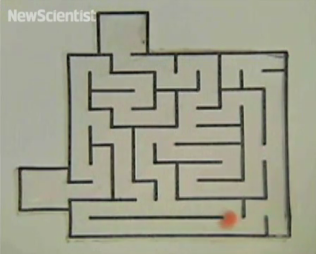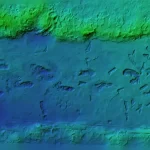New Scientist
Image: ACS
There’s some humbling news from the chemical world for anyone who has ever found themselves lost in a garden maze. A simple droplet of organic solvent can find its way through a complicated labyrinth with nothing more to go on than a slight pH difference.
Bartosz Grzybowski‘s team at Northwestern University in Evanston, Illinois, used a common polymer to fashion a two-dimensional labyrinth some 2 centimetres on each side. They then flooded the maze with strongly alkaline potassium hydroxide solution, before placing a hydrochloric acid-soaked chunk of gel at the maze exit.
After about 40 seconds they placed a droplet of mineral oil containing hexyldecanoic acid at the maze entrance. The oil, which cannot mix with the potassium hydroxide solution, sits on the surface. But it remains still only for a matter of seconds – it soon begins tearing around the maze at speeds of up to 10 millimetres per second, sniffing out the shortest path to the acid-soaked gel, and solving the maze in the process.
“In the movie files you can see the droplet makes decisions,” says Grzybowski. “It goes left along the wrong path, decides there’s something fishy with that and so it reverses. It looks almost alive.” Read more on newscientist.com…








